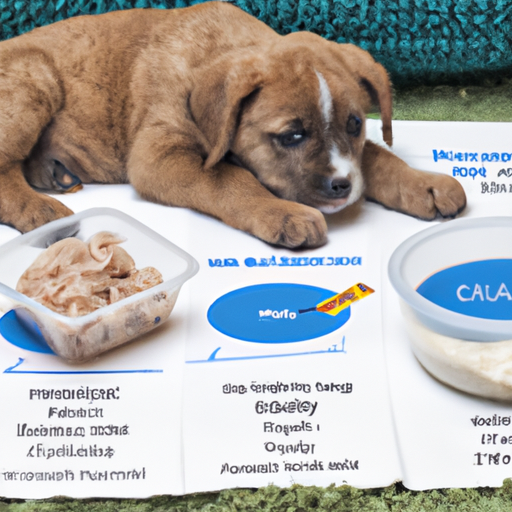Understanding Your Puppy’s Dietary Needs
As a new pet parent, you might find yourself asking, “How much should I feed my 15-week old puppy?” This is a crucial question, as proper nutrition is vital for their growth and overall health.
The amount you feed your puppy varies based on several factors such as the puppy’s breed, size, metabolism rate, and level of activity. For instance, larger breeds require more food than smaller breeds due to their rapid growth rates.
Here’s a helpful table to guide you on the general feeding guidelines for puppies:
| Puppy Size | Daily Calories |
|---|---|
| Small (1-10 lbs) | 200-400 |
| Medium (10-25 lbs) | 400-800 |
| Large (25-75 lbs) | 800-1600 |
| Extra Large (75+ lbs) | 1600-2400 |
Remember, these are just estimates. Each puppy is unique and may require different amounts of food.
Choosing the Right Puppy Food
The next step is selecting the right food for your puppy. A balanced diet is essential for their overall health and growth. Look for puppy food that is high in protein and contains a good balance of carbohydrates, fats, vitamins, and minerals.
- Protein: This is vital for muscle growth and repair. The protein source should be from real meat such as chicken, beef, or fish.
- Carbohydrates: Good sources of complex carbs include sweet potatoes, brown rice, and oats.
- Fats: Healthy fats provide energy and help in the absorption of vitamins. Look for omega-3 and omega-6 fatty acids.
- Vitamins and minerals: These are essential for bone growth, immune system support, and overall health.
Avoid foods with artificial colors, flavors, and preservatives. Make sure to read the label and choose a food specifically designed for puppies.
Determining Feeding Portions and Frequency
Once you’ve chosen the right food, it’s time to determine how much and how often to feed your 15-week old puppy.
- For small breed puppies, they typically need to be fed four times a day.
- Medium to large breed puppies can be fed three times a day.
You can gradually reduce the feeding frequency as your puppy grows. By six months, most puppies should be eating two meals a day.
When determining portion sizes, refer to the feeding guide on your puppy’s food packaging. These guides are based on your puppy’s expected adult weight. However, remember that these are just guidelines and your puppy’s actual needs may vary.
Monitoring Your Puppy’s Weight
Regular weight checks are essential to ensure your puppy is growing at a healthy rate. If your puppy seems to be gaining too much weight, you may need to reduce their food portions. Conversely, if they’re not gaining enough weight, you may need to increase their portions.
Remember to make any changes gradually to avoid upsetting your puppy’s stomach. Consult with your vet if you’re unsure about your puppy’s weight or diet.
Recognizing Signs of Overfeeding or Underfeeding
Overfeeding or underfeeding can lead to various health issues.
Signs of overfeeding include:
- Rapid weight gain
- Bloating
- Loose stools
Signs of underfeeding include:
- Weight loss or slow weight gain
- Visible ribs, hip bones, or spine
- Constant hunger
If you notice any of these signs, consult your vet immediately.
FAQ
Q: Can I feed my puppy adult dog food?
A: No, puppies have different nutritional needs compared to adult dogs. They require more protein and certain nutrients for their growth and development.
Q: How do I switch my puppy to a different food?
A: Make the switch gradually over a week to avoid upsetting your puppy’s stomach. Start by mixing a small amount of the new food with the old, gradually increasing the new food each day.
Q: Should I free feed my puppy?
A: It’s generally not recommended as it can lead to overeating and obesity. Stick to scheduled meals and controlled portions.
Q: Can I give my puppy treats?
A: Yes, but in moderation. Treats should make up no more than 10% of your puppy’s daily calorie intake.
Q: What if my puppy doesn’t like their food?
A: Puppies can be picky eaters. You can try adding a little warm water to their kibble or mixing in a bit of canned puppy food. If your puppy still refuses to eat, consult your vet.
Feeding your 15-week old puppy might seem complicated, but with a little knowledge and understanding, it becomes an easy task. Remember, the goal is to provide a balanced diet that supports your puppy’s growth and development. Always consult with your vet if you have any concerns or questions about your puppy’s diet.



